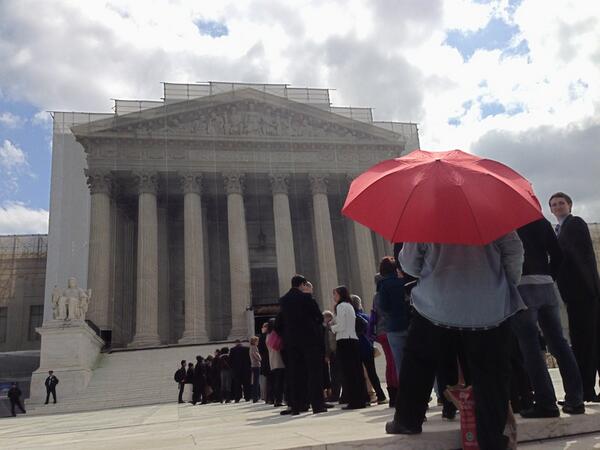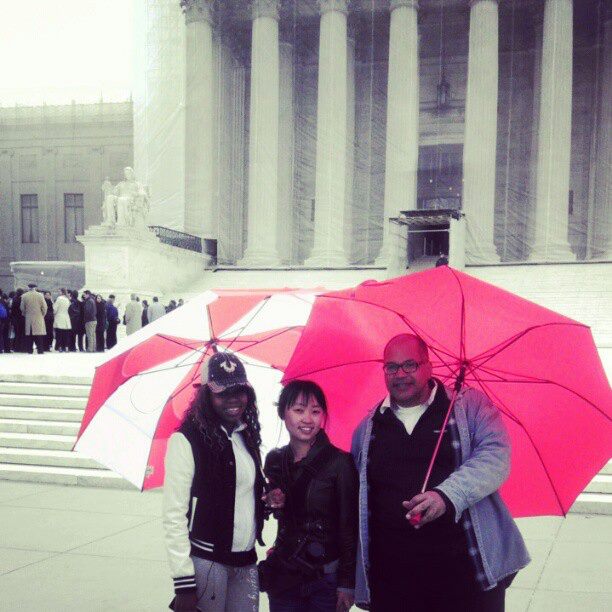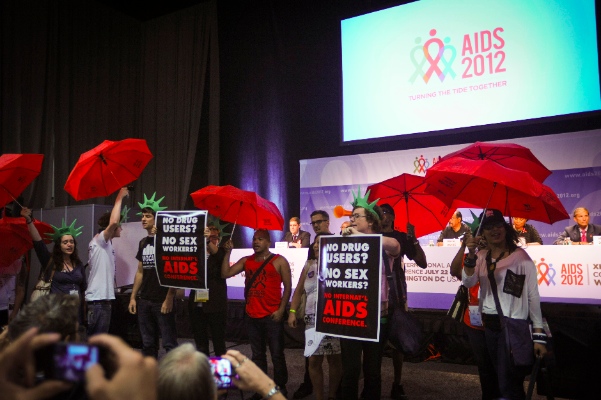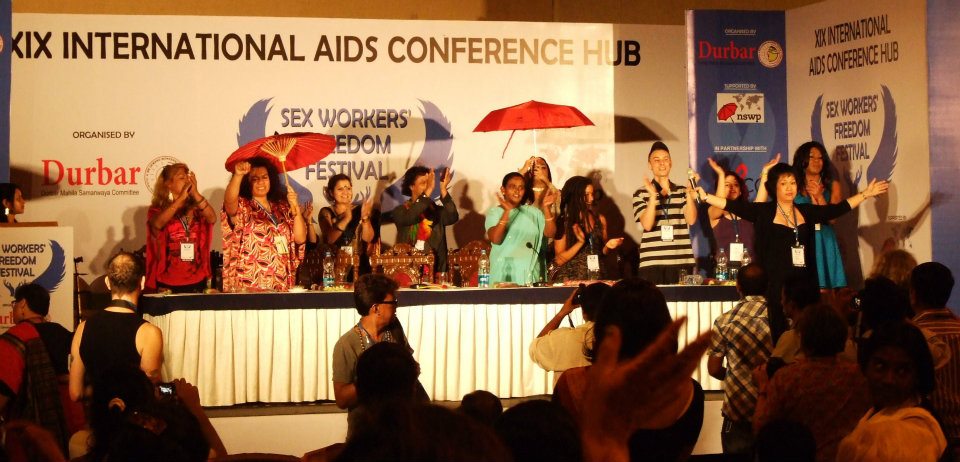
On April 22nd, 2013, the U.S. Supreme Court heard oral arguments for Agency for International Development v. Alliance for Open Society International, Inc. concerning whether the Anti-Prostitution Loyalty Oath (APLO), written into the President’s Emergency Plan for AIDS Relief (PEPFAR), violates the First Amendment right to freedom of speech. The contested legislation is the U.S. Leadership Against HIV/AIDS Tuberculosis, and Malaria Act of 2003, or the Global AIDS Act, which states that no funds made available by PEPFAR “may be used to provide assistance to any group or organization that does not have a policy explicitly opposing prostitution and sex trafficking.” In August 2005, DKT International, a nonprofit working to improve access to reproductive health services in Latin America, Africa, and Asia, filed a lawsuit against USAID, challenging the anti-prostitution requirement. The case, DKT v. USAID, won in lower district courts, temporarily keeping the enforcement of APLO away from U.S. organizations; however, in February 2007, the U.S. Circuit Court reversed this ruling. In September 2005, the Alliance for Open Society International, Inc. (AOSI) filed a similar suit against USAID. This case was accepted by the Supreme Court in January 2013.
The Anti-Prostitution Pledge is an example of U.S. commitment to moral ideology over public health. Sex worker activists on Facebook organized the Red Umbrellas at the Supreme Court demonstration for this hearing.
Addendum: At the time of publication, the Supreme Court had just struck down the PEPFAR Pledge as of one hour ago. However, this editorial’s point still holds: OSI should have held a stronger stance on decriminalization, and there is still much work to do for sex worker activists to push forward from the momentum of this court decision.
There were only two red umbrellas in front of the Supreme Court, in spite of eager support on the Facebook event page. Actually, one of these red umbrellas was striped: only half-red and half-white, a last minute compromise during a rushed subway scramble. As described in Melissa Gira Grant’s article in The Nation, even these two unassuming umbrellas were folded away and stuffed like contraband beer into organizer David Perez’s brown paper shopping bag. We stood on the Courthouse steps, behind a group of chipper public health advocates in yellow t-shirts. Our 9:00 AM meet-up time was inopportune, as we were a few dozen places late of a seat at the hearing. Umbrellas aside, we really left neither a visual nor numerical impression.
To be fair, it was a Monday morning, and most people had to be at work, or couldn’t afford to travel whatever distance was required to get to D.C. for what appeared to be nothing more than a token Twitter photo op in support of sex worker rights. Academic Jennifer Reed was wonderfully supportive from afar, posting media reports onto the event’s Facebook page and Twitter. Activist Carol Leigh released a statement, proudly proclaiming the manifesto of our phantom umbrellas.
So it was uncomfortable how few of us were actually there that day. My friend from Streetwise and Safe and I hopped on a bus from NYC the night before – we came to join a rally, not expecting to be two-thirds of the rally. Chatting quietly, we nervously awaited other Facebook invitees and stood on line until long after the hearing began, just the three of us, feeling confused because nobody else showed up.
In the two months following the hearing, sex workers continued to be nearly invisible in the media coverage of the case. Public health experts and international NGO’s, which speak for us, took on an extremely clinical tone, sternly cautioning the respectable public of the grave risks of our national disease-mongering, should the prostitutes of the world be left untreated; almost apologizing for the need to have to deal with us, the ignorant and prolific carriers of sickness that we are. Nowhere, in any media report, was there a quotation from a sex worker or any sex worker-led organization.
But I suppose that is the nature of evidence-based research; evidently, we are qualified only to be objects of others’ study. Since this case was about freedom of speech, it might seem ironic that sex workers were rarely ever invited in any media outlet to speak on our own behalf regarding the Anti-Prostitution Pledge. The people who were supposed to speak for us, the Open Society Institute and its attorney David Bowker, were all too ambivalent in their oral arguments, afraid to stand up firmly in support of sex worker human rights, bearing only the half-red and half-white umbrella of public health and Constitutional law.

During the hearing, Bowker was hesitant to make any statement defending sex worker human rights, stating instead that he wanted “to be clear” that OSI does not “approve” of prostitution—which was misinterpreted by National Public Radio and the popular press to mean that Bowker and OSI are “opposed to prostitution.”
That was hardly the case. OSI had previously released the following statement, regarding the criminalization of sex work, which Brockett did not feel was appropriate to stand behind during the Supreme Court hearing:
Open Society believes that an effective response to HIV and AIDS must address the structural factors that affect sex workers—including the punitive laws and policies that criminalize their work. And we are not alone.
Bowker’s silence regarding sex worker rights, which misrepresented OSI’s stated position on decriminalization, was a disappointing move, which also contradicts the position of the WHO, UN, Human Rights Watch, and many other international organizations that have publicly declared the decriminalization of sex work as their stance in the interest of human rights. However, the problem in the U.S., where prostitution is criminalized in most states, is that there was little actual room in this case for sex workers to speak.
Since prostitution is criminalized, Bowker’s hedging was a strategic choice, deemed necessary to attain the greater goal of improving sex worker health. But was it justifiable to further contribute to stigma as a means to some greater end? This meek discretion did not invite legal opinions that might have set precedence for future legislation favorable to the longer legal battle for sex worker human rights in the United States.
“Are we still at a point where the only way to advocate for sex workers’ rights through the judicial system is to first assure the public that we do not approve of sex work?” wrote Kat Thomas, who reported on the hearing for the Best Practices Policy Project, questioning the “problematic nature” of this “disquieting” strategy, which denies sex worker human rights in favor of First Amendment protections. Unlike our neighbors up North, with the Bedford v. Canada Supreme Court case on June 13th, where the complete decriminalization of all Canadian laws related to prostitution is being considered, U.S. state laws are firmly anti-prostitution. Our justices are not looking out for the welfare of sex workers, except in relation to disease prevention and human trafficking. Sex workers are seen as an obstacle to public health and the U.S. stance is that the elimination of prostitution is “germane” to the fight against HIV.
At the end of the day, this was the crucial question that needed to be decided by the Court. USAID maintained that eliminating prostitution is “germane,” or absolutely necessary and central, to the mission of fighting HIV/AIDS, (though it exempted certain organizations from having to follow APLO, including the Global Fund for AIDS, the World Health Organization, the International AIDS Vaccine Initiative, and all UN agencies.) Brockett questioned how “germane” APLO is if the U.S. would exclude such major partners from the clause. Meanwhile, most other public health organizations worldwide, including the World Health Organization and UN Global Commission on HIV and the Law, have published statements saying that decriminalizing sex work is necessary to respond to the HIV/AIDS epidemic. In their opinion, criminalizing prostitution isn’t “germane” to fighting AIDS, but actually goes against the basic mission of reducing HIV infection.

Evidence-based research shows that collaborating with sex workers in a community-health based model, like the Sonagachi model in India, and VAMP, a sex-worker-led peer health project by SANGRAM, which is praised as “transformational” by USAID – is actually the most effective strategy for responding to the AIDS epidemic. The fight against HIV has empowered sex workers in India to organize on their own behalf, and sex workers are effective partners in fighting human trafficking. However, the U.S. government does not want to negotiate with sex workers, mainly because it continues to conflate prostitution with sex trafficking. This conflation, which was the driving force behind APLO, remains a central obstacle to building consensus around sex worker rights.
Even the Public Health Amici Curiae brief in support of OSI, submitted by groups including Partners in Health, Global Alliance Against Traffic in Women, and Planned Parenthood, highlighted “the marketplace of ideas in public health,” rather than human rights, as the primary reason why the Court should be opposed to the Anti-Prostitution Loyalty Oath. They claimed that APLO restricts the “marketplace” of scientific thinking around best health practices, and that this market must be made free in order for the best scientific research to rise to the top, since “public health should operate without ideological restrictions.” Using free market ideology to defend science and public health is the kind of justification that even conservatives might find themselves nodding along with, (though it is a patently poor way of doing so.) Much like the meek positioning of the Democratic Party during our general elections, it seems that those who claim to defend the rights of minority groups in our country are ever busy anticipating and catering to the opposition’s ideological inclinations, rather than firmly standing behind their own.
The case in the Supreme Court was in no way about whether or not APLO is inherently unjust and harmful to sex workers. The pledge discriminated against sex workers, though the U.S. had made a commitment to address the human rights violation of discriminatory treatment towards sex workers in 2011 at the United Nations Human Rights Council. U.S. funding policies effectively isolated sex workers worldwide by directing the attention of public health organizations away from the people who need it most, preventing them from receiving life-saving health treatment, while contributing to life-threatening stigma. The pledge requirement caused a condom shortage among sex workers in Mali, the withholding of safer sex information from male sex workers in Cambodia, and the closure of community drop-in centers in Bangladesh “where sex workers had previously attained condoms, health information, respite and solidarity.”According to research published in the Journal of the International AIDS Society in March 2013, many organizations worldwide had limited or eliminated HIV programs for sex workers in order to receive PEPFAR funding, leading to many unintended consequences. If the Court had ruled in favor of APLO, then similar effects would probably have taken place within the U.S., where a trial court has kept the enforcement of the pledge at bay for American organizations since 2006.
However, during the hearing on April 22nd, instead of directly questioning the U.S. stance on prostitution, both sides ruminated over fine lines and nuanced euphemisms. According to the Scotus analysis of the case, “it was not clear that the hour’s efforts had brought any new clarity to the constitutional dilemma.”
One key debate concerned how to draw the line between the government’s right to “pick partners” in funding public health projects, and overstepping that line by using funding to “speak through” organizations. The justices threw hypotheticals at the prosecution, ranging from funding recycling programs to apartheid: “Let’s say the government wants to support the development of water resources in South Africa before the abolition of Apartheid,” Justice Roberts asked, “Are you saying that the government cannot prefer an anti-Apartheid organization over a pro-Apartheid water driller?”

To Bowker’s chagrin, he had no strong response. In the context of a defense preoccupied with public health aims, without equal emphasis on human rights, it was easy to imagine that if the pro-Apartheid water driller were more efficient at drilling water, then the government should, by this logic, fund that project, without imposing moral judgment upon the Apartheid. That’s why the public health logic, alone, is flawed when devoid of human rights arguments, and why OSI’s public health arguments needed to be accompanied by a firm stance in support of the human rights of sex workers.
Amidst the ruffled feathers of Apartheid arguments, with the shock of racism and genocide all thrown into one blinding strike—like the silencing slap of human trafficking arguments—Bowker neglected to respond that First Amendment rights really apply only to U.S. citizens and U.S. organizations, and this particular case was actually about the extension of the anti-prostitution loyalty oath to American organizations, which had been made exempt from APLO due to a temporary order issued by a trial court in 2006. Thus, this international hypothetical raised by Justice Roberts was somewhat inappropriate, since there are domestic laws against such discrimination. But here lies another inherent weakness in couching arguments on civil liberties rather than on international human rights: the First Amendment only legally applies to U.S. citizens.
Another line of questioning concerned whether or not it is fair to require organizations to create partner organizations, with “sufficient” separation, if they choose to conduct activities that are not explicitly anti-prostitution. This separation clause in APLO was reminiscent of the Global Gag Rule in Mexico City, concerning abortion, which President Obama publicly opposed in 2009. Justice Ginsburg argued that this requirement is unduly difficult for the organization, and still a violation of free speech—the Federal government is still using funding to exert undue influence, to the detriment of already “marginalized and vulnerable populations.”
There are quotation marks around the clinical language above because, as a movement, we would do well to be wary of the double-edged language of public health in policy. Here, in this case, evidence-based research was in our favor. But the human rights of sex workers can both be defended and silenced by public health aims. Science is agnostic to its impact on the sex worker movement’s struggle for human rights and dignity. The public health community may be our allies now, but they are not necessarily our friends indefinitely.
It’s important to acknowledge that the legal strategy used by OSI was probably the best course of action we had. By challenging APLO as a violation of freedom of speech, OSI made it possible for the Supreme Court, which focuses primarily on Constitutional and federal cases, to hear this case as a top priority First Amendment case. OSI wouldn’t have been able to make as strong a case based on international human rights because human rights conventions are far less enforceable; furthermore, a case based on “sex worker human rights” is implausible so long as sex work is criminalized. But PEPFAR is not the biggest limiting factor on whether or not sex workers receive health treatment worldwide; criminalization is. Regardless of how the APLO question was decided, the implementation of PEPFAR health funds will still be limited by national laws. Still, by taking too shy a position on sex work during the hearing, OSI made it harder to create future legislation on decriminalization.
Today’s Supreme Court decision struck down the anti-prostitution loyalty oath. The ruling was a victory for First Amendment rights, but today’s media reports continue to emphasize that the Supreme Court is not in favor of prostitution. However, this precedent will provide momentum for the sex worker movement to carry forward towards a greater struggle towards decriminalization in the United States, and there is still a lot of work to do to that end. I hope that we, sex workers, have learned from this experience, and will be prepared to lift our red umbrellas in greater numbers for the next challenge.
Legal Citations
A full transcript of the oral arguments at the Supreme Court available here.
Brief of Deans and Professors of Public Health and Organizations Working in Public Health Policy and Implementation as Amici Curiae in Support of Respondents, Agency for International Development v. Alliance for Open Society International, Inc. 12-10 U.S. (2013). [Available here].
Brief of the American Civil Liberties Union and New York Civil Liberties Union as Amici Curiae in Support of Respondents, Agency for International Development v. Alliance for Open Society International, Inc. 12-10 U.S. (2013). [Available here].
United States Leadership against HIV/AIDS, Tuberculosis, and Malaria Act of 2003. 22 U.S.C. 7601. Public Law 108–25, 108th Congress. 117 Stat. 711. May 27, 2003 [Available here]
Public Health and Policy References
Asthana S, Oostvogels R. Community participation in HIV prevention: problems and prospects for community-based strategies among female sex workers in Madras. Soc Sci Med. 1996; 43:133–148. [PubMed]
Brennan Center for Justice at NYU School of Law. Memorandum to advocates interested in the anti-prostitution policy requirement. 2010. [Sribd]
Dasgupta, Satarupa. Communication and community mobilization, anti-trafficking and legitimization, participation and empowerment: HIV/AIDS intervention and the Sonagachi Project.” Temple University, 2011. [ProQuest]
Ditmore, Melissa Hope, and Dan Allman. “An Analysis of the Implementation of PEPFAR’s Antiprostitution Pledge and Its Implications for Successful HIV Prevention Among Organizations Working with Sex Workers.” Journal of the International AIDS Society, Vol 16. (2013) [Full article]
Forbes A. Sex work, criminalization and HIV: lessons from advocacy history. Beta. 2010 [Full article]
Kelly JA. Community-level interventions are needed to prevent new HIV infections. Am J Public Health. 1999;89:299–301. [PMC free article][PubMed]
Prabhakar Parimi et al., Mobilising community collectivisation among female sex workers to promote STI service utilisation from the government healthcare system in Andhra Pradesh, India, 66 J. Epidemiology & Community Health 62 (2012). [Available Here]
UNAIDS Female Sex Worker HIV Prevention Projects: Lessons Learnt From Papua New Guinea, India, and Bangladesh. UNAIDS; Geneva, Switzerland: 2000. [Full article]
UN Global Commission on HIV and the Law. Risks, Rights and Health. (Jul. 2012) [Full article]
World Health Organization, Prevention and Treatment of HIV and other Sexually Transmitted Infections for Sex Workers in Low- and Middle-income Countries: Recommendations for a Public Health Approach (Dec. 2012), at 21. [Full article]
Great article. Is it Bowker or Brockett, though?
Brokett – thank you for your correction. I’ve notified the editor.
OSI wouldn’t have been able to make as strong a case based on international human rights because human rights conventions are far less enforceable
The problem here goes beyond “less enforceable”. The US hasn’t even ratified the convention which guarantees the right to health, the obvious international human right involved here. So there wouldn’t even be a legal basis for a challenge of that nature. It would have fallen at the first hurdle.
Well-put, Wendy – the U.S. has signed but not ratified the ICESR, one of the two original core human rights conventions, which as I understand it, is what contains the Right to Health – which is a shame. President Jimmy Carter signed ICESR, but it didn’t pass through the Senate. Carter has also signed, but not ratified, CEDAW, another convention that could be instrumental to addressing violence against sex workers. Furthermore, we have neither signed or ratified the Migrant Worker Convention, and we are not part of the International Criminal Court.
Even for conventions in which American NGO’s have originally done a lot of work in helping to create, it is challenging to get the U.S. legislature to recognize otherwise self-executing treaties. The rationalization for this, according to constitutional scholars, is because doing so would violate the separation of powers, namely the judiciary and the Congress – under Article III, only the judiciary has the right to apply treaty law to cases before the court; Congress also often contends that certain human rights conventions don’t add anything to U.S. domestic law’s human rights provisions.
The International Covenant on Civil and Political Rights, the other original core human rights convention, was ratified with many reservations, after more than two decades of inaction. I agree that it is really a shame that the U.S. is not more active in human rights – where it could have taken the momentum of Eleanor Roosevelt, Jimmy Carter, and even 9/11 to take greater leadership in defending human rights globally, it has instead made a travesty of its own human rights record and contributed to the weakening of international human rights instruments.
Really, a Shame.
This has been my expereince for years. I’m sure I’m not the only one who has experienced actual counter organizing by the hIV groups as they, like other ngos hate it when we ‘marginalized’ speak up for ourselves.
Great review and analysis of the AOSI vs USAID #PEPFARcase.
Clearly this was an offensive law and we must be grateful that SCOTUS found that it violates free speech. However, we must also beware of gifts being borne to Troy: This decision could also be used as a back-door attack in support of the Christian Right Wing agenda insofar as it has the potential to limit through specificity certain rights that we are trying to enforce, such as the right of a non-believing woman who works for a Catholic-owned business to have health insurance that covers elective abortions, pharmaceutical abortifacients, and birth control drugs and/or devices.
Very true, Peter – we have yet to see how this may be used against us.
An article worth reading:
http://www.salon.com/2013/06/20/why_did_john_roberts_rule_for_sex_workers/singleton/
The lack of Red Umbrellas would be from the lack of info and organization. I see other countries organizing better over the internet than we do. And I think that is the key. I go on sites well known and they’re not active, haven’t been updated since 2010 lol I think that the more we talk about these things, the more we get involved the better things will be. Thanks for the analysis
Thanks for your reply – is this Emma? Just guessing from New School and Red Umbrellas – very excited to see that we are growing as a movement, due to a lot of the organising around HIV/AIDS and the IAC last summer. The statements supporting decriminalisation from WHO, Human Rights Watch, UNAIDS, and other international human rights organisations do contribute a lot of legitimacy and momentum to our cause, especially as the moral panic of human trafficking research is increasingly shown to be problematic, when the biggest trafficking investigation in history in the UK failed to find any evidence for it; and opinion from feminist and other social movements also seem increasingly sympathetic to what sex worker activists have long been saying for decades.
I think the international sex worker movement is using better organising strategies every year to accomplish a lot more with little to no funding, which is great. It’s an exciting time to get involved and make things better.
Our court case is the only way to directly challenge the anti prostitution laws siting the first amendment violation. http://www.esplerp.org/ The human rights aspects that are used in Europe was sited by, I believe Justice Kennedy when deciding for Lawrence Vs Texas in 2003. That case is foundational to our case. Please help us get our case into court as its the only way we’re going to dismantle these bad laws and their human rights violations.
YES!! Very much admire the work that ESPLERP is doing, Maxine. Best wishes!